Kuwait: In a new effort to reinforce its commitment to society, sustainability and the planet, Kuwait International Bank (KIB) organized a comprehensive workshop that discussed environmental, social, and governance (ESG) essentials in the banking industry. The workshop, which addressed staff members across all departments and job grades, was delivered in cooperation with the American University of Kuwait’s (AUK) Center for Continuing Education (CCE). This workshop comes under the umbrella of KIB’s dedication to the overall development of its staff, in addition to its role as a proactive advocate of sustainability in Kuwait.
In a bid to offer a well-rounded educational experience for the attendees, the two-day workshop addressed a wide range of topics that cover all aspects of ESG essentials and practices in the banking industry. The topics discussed included everything from definitions and examples to the benefits of implementing a strong ESG plan, the history of ESG, and how countries in the region and around the world turn ESG principles into actionable strategies. Other topics highlighted the relationship between sustainability, risk, and strategy, as well as how to integrate ESG considerations in a coherent plan that bolsters business performance.
Commenting on the workshop, Siham AlKhorayef, Manager – Learning and Development at KIB, said: “Sustainability begins and ends with people. It begins with the people who are aware of the importance and benefits of sustainability, and it ends with the people who are enabled to live a better, more fulfilling life, thanks to the inclusive sustainable considerations that consider the welfare of the entire social ecosystem and not just its strongest players.”
AlKhorayef went on to explain that, as the Bank’s most valuable resource, human capital management is among the scopes of business that have advanced greatly in light of ESG principles implementation. “Contrary to the popular interpretation of sustainability, ESG goes far beyond eco-friendly practices,” AlKhorayef added. “It’s about utilizing every resource, from staff to community talents and national resources, in a balanced way that guarantees welfare for all.”
On his part, Nawaf Najia, Executive Manager of the Corporate Communications Unit at KIB, noted: “Our commitment to sustainability is reflected in our continued efforts to ensure that ESG practices are engrained in the planning and execution of every product, service, or even community initiative. That’s why it is pivotal that every staff member is well-versed in the nuances of ESG and their modern application. In doing so, we are taking confident strides toward a stronger economy, a more enabled society, and an overall better quality of life for all.”
It serves to note that KIB is the first and only bank in Kuwait to have endorsed the United Nations (UN) Global Compact. By joining the world’s largest corporate sustainability initiative, KIB pledges its commitment to adopting and spreading ESG practices and standards within the institution and across the community.
-Ends-
About KIB
Kuwait International Bank (KIB) is a bank that operates according to the Islamic Shari’ah, based in the State of Kuwait. Incorporated in 1973, and originally known as Kuwait Real Estate Bank, KIB made the transition to its current Islamic operating model in 2007. In 2018, KIB embarked on a new phase of its journey full of innovation and development. As part of its new strategic direction, the Bank focuses on offering a next-level customer experience under the slogan: “Bank for Life”.
Through a network of branches spread across the State of Kuwait, KIB offers a broad range of banking products and services, as well as innovative digital banking solutions in line with international best standards. As part of its duty towards the community, the Bank also encompasses a leading social responsibility program that aims at positively impacting all members of the community through a wide range of impactful initiatives and activities.
Today, KIB has taken concrete steps in implementing its new strategic objectives. The Bank has cemented its role as a key player in the local banking industry and has continued to maintain its strong financial performance; enabling it to be globally recognized for its strong credit rating and financial position.



















